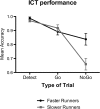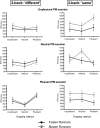It's a Matter of Mind! Cognitive Functioning Predicts the Athletic Performance in Ultra-Marathon Runners
- PMID: 26172546
- PMCID: PMC4501764
- DOI: 10.1371/journal.pone.0132943
It's a Matter of Mind! Cognitive Functioning Predicts the Athletic Performance in Ultra-Marathon Runners
Abstract
The present study was aimed at exploring the influence of cognitive processes on performance in ultra-marathon runners, providing an overview of the cognitive aspects that characterize outstanding runners. Thirty runners were administered a battery of computerized tests right before their participation in an ultra-marathon. Then, they were split according to the race rank into two groups (i.e., faster runners and slower runners) and their cognitive performance was compared. Faster runners outperformed slower runners in trials requiring motor inhibition and were more effective at performing two tasks together, successfully suppressing the activation of the information for one of the tasks when was not relevant. Furthermore, slower runners took longer to remember to execute pre-defined actions associated with emotional stimuli when such stimuli were presented. These findings suggest that cognitive factors play a key role in running an ultra-marathon. Indeed, if compared with slower runners, faster runners seem to have a better inhibitory control, showing superior ability not only to inhibit motor response but also to suppress processing of irrelevant information. Their cognitive performance also appears to be less influenced by emotional stimuli. This research opens new directions towards understanding which kinds of cognitive and emotional factors can discriminate talented runners from less outstanding runners.
Conflict of interest statement
Figures



References
-
- Bate D. Soccer skills practice In: Reilly T, editor. Science and soccer. London: E & FN Spon; 1996. p. 227–241.
-
- Starkes JL, Ericsson KA. Expert performance in sports: Advances in research on sport expertise. In: Human Kinetics Publishers. Champaign, IL; 2003. p. 371–402.
-
- Holyoak K. Symbolic connectionism: Toward third-generation theories of expertise In: Ericsson KA, Smith J, editors. Towards a general theory of expertise. Cambridge: Cambridge University Press; 1991. p. 301–336.
-
- Starkes JL, Allard F. Cognitive issues in motor expertise Amsterdam: North-Holland; 1993. p. 365.
Publication types
MeSH terms
LinkOut - more resources
Full Text Sources
Other Literature Sources

